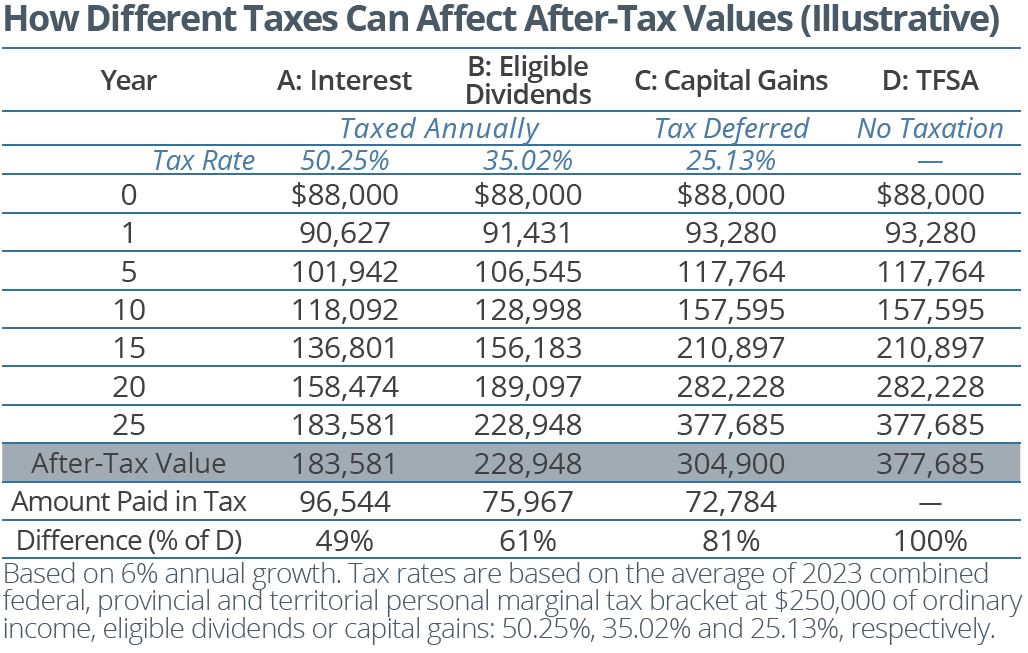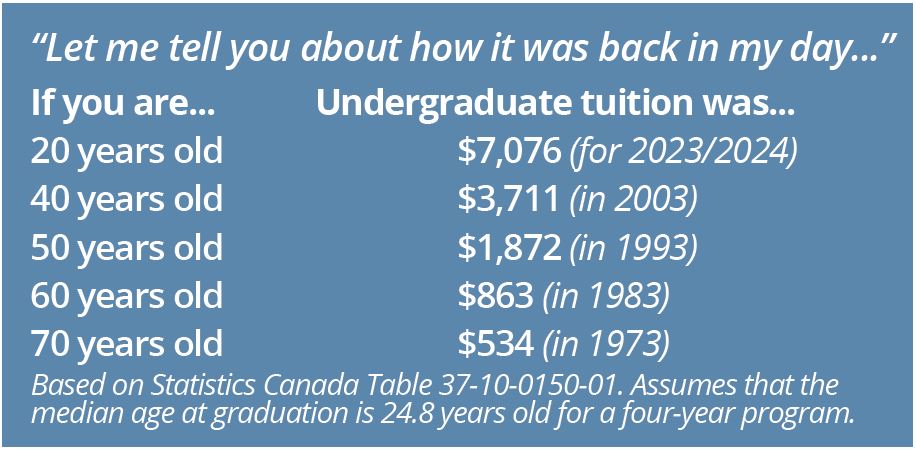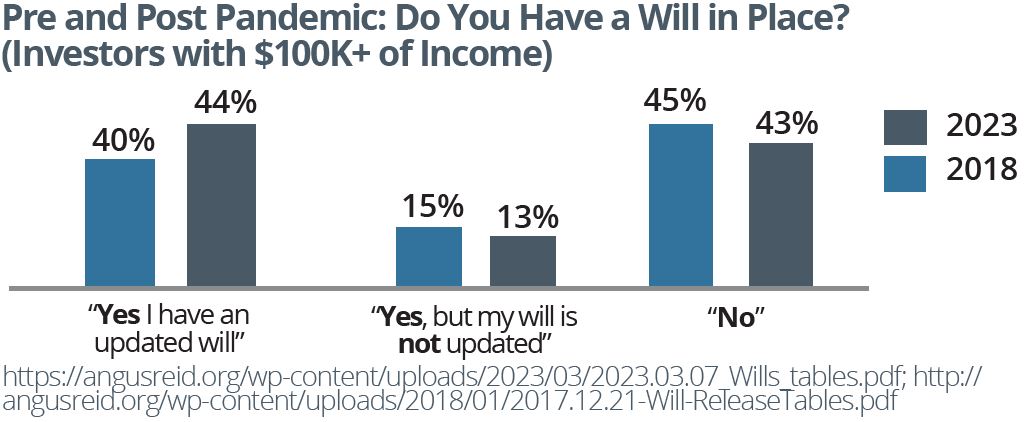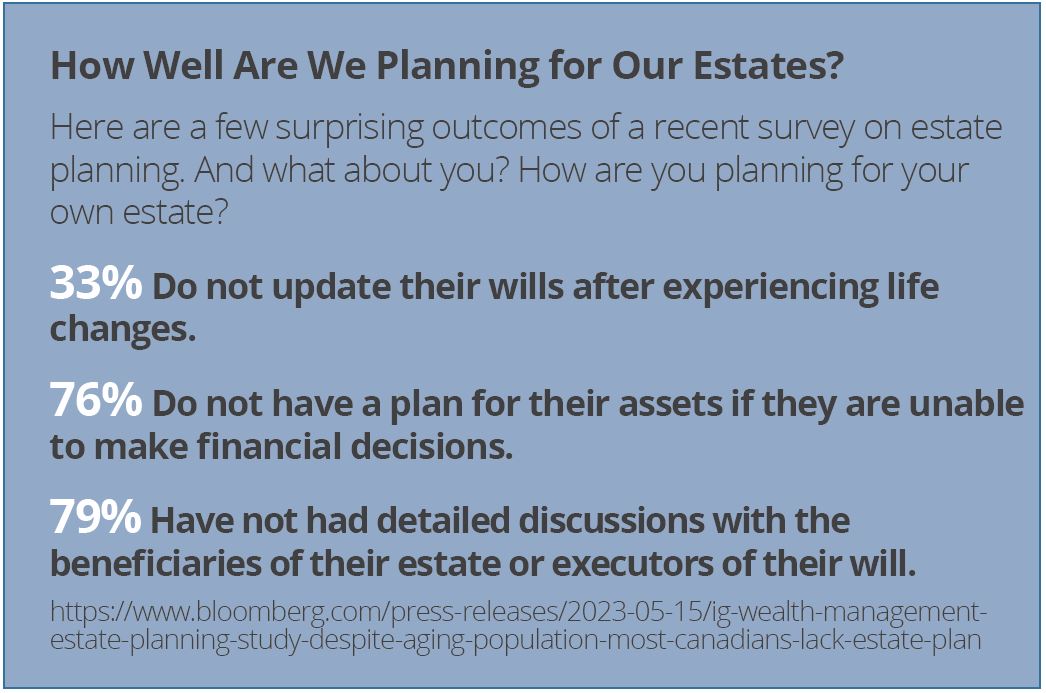The Golden Years: More Golden
Chances are “you might live longer than you think.” This was the longevity message of a Wall Street Journal article earlier this year.1 Indeed, we are living longer and healthier lives — half of those born today are expected to live to the centenarian age of 100.2 And, though the average Canadian’s life expectancy is around 82, if you reach the age of 75, you’re likely to live until age 87. Our life expectancy increases as we get older.3
Notably, this points to the importance of wealth planning to ensure that our funds have similar longevity. This is challenged by the ongoing trends of declining workplace pensions, the growing costs of dependents, the potential high costs of health care later in life and ambiguous government support — though actions like the CPP reforms, with more changes set to begin in 2024, are expected to make a marked difference to future retirees, especially those who haven’t been able to make wealth planning a priority.
The good news? Retirees today appear to be doing a pretty good job. A study from Statistics Canada suggests that recent retirees have experienced greater income growth and maintained more of this income in retirement than ever before. Their conclusion: The “golden years of retirement have become more golden.”4
As wealth advisors, preparing our clients financially for the future — including an extended one — remains a key focus. Whatever your plans for the golden years, the ability to make choices for the activities you wish to pursue is important. You may choose to continue working, but wouldn’t it be nice to do so on your own terms, not by financial need. Or you may wish retirement to resemble an extended vacation. The common thread should be to have the financial wherewithal to allow you to decide.
The $1.7 Million Head Start
According to many Canadians, this is the amount of savings we feel is needed to retire.5 Consider that a 20-year-old investing $125 per week for 25 years, at a rate of return of 6 percent, would have around $378,000 by the age of 45. But, leaving this amount to compound at the same rate would yield $1.7 million by age 70. This is our way of pointing out that even a modest investment program can result in significant outcomes over time. Just imagine the head start a young person would have in retirement with an “extra” nest egg of $1.7 million. A bit of discipline, consistent savings and an investing program that relies on relatively modest contributions each year could steadily progress towards this goal over time.
For those of us further down the road, the principles remain the same: having a sound plan, contributing consistently and having the determination to follow through. The tactics may occasionally need to change to meet the prevailing market conditions, or we may need to fine-tune your plan, but don’t overlook the importance of a commitment to your plan. It has been built to return dividends down the road. And even if you are living through retirement, it is a good reminder that the road ahead may still be a long one.
As we enter the final months of the year, autumn, the season of change, is a reminder that time changes all things — perhaps even our financial obligations or goals. If a review is in order, or if there are investing actions you need to take before year end, please get in touch.
U.S. CREDITRATING: RECENTLY Downgraded
Credit Scores: When Was the Last Time You Checked?
It has been said that “there are two things you should never be without: your reputation and your credit rating. You can destroy them both in an instant and spend the rest of your life trying to get them back.”
Over the summer, the long-term credit rating of the world’s largest economy was downgraded for only the second time in history. Fitch downgraded the U.S. rating from AAA to AA+. A country’s credit rating is an independent assessment of the country’s creditworthiness, which can give investors insight into the level of risk associated with a nation’s debt, as expressed by a letter system. Canada maintains a similar credit rating to the U.S. of AA+ (Fitch). A downgrade is generally seen as a signal of concern about a nation’s creditworthiness. However, given the suggested political “dysfunction” over the spring debt ceiling debate, the recent downgrade may be less related to the U.S.’s ability to pay its debt and more related to its willingness to do so.
This is a good reminder that, as individuals, we also have “credit ratings,” as expressed through our credit score — a numerical range between 300 and 900, with a score of over 700 considered as good. The two main Canadian credit bureaus, Equifax and TransUnion, keep track of your credit through public records of lenders like banks, collection agencies and credit card companies and assign a score based on your credit history and your ability to pay bills on time and in full.
When was the last time you checked your score? There may be reasons to make this a priority, especially if you haven’t checked lately.
Establishing good credit can take time. One common issue seen with older couples is that one spouse may have a good credit rating, but the other will have none. If the spouse with the good credit rating passes away, the other often has difficulty qualifying for a loan or obtaining a credit card. Building a good credit score takes time.
You may uncover or protect against fraud. Periodically accessing a credit report may be valuable not just to check your credit score, but also to help guard against identity theft. A credit report may list accounts that you haven’t opened, which may uncover possible fraud. The credit bureaus also offer monitoring services that can notify you if there are changes to your credit position. You can also add security measures, such as a fraud alert, when financial providers issue new credit in your name. Some of these services incur fees, but the cost may be worthwhile as fraudulent activity becomes increasingly sophisticated.
Your credit score matters. Many young people may have limited experience with credit and do not realize that having a good credit history can make life easier. It is important because your score determines how lenders assess your credit capacity — the higher the score, the greater the likelihood that you’ll be approved for mortgages, loans or credit. It is also often checked when applying to rent a property and is sometimes checked during the job application process.
DOLLARS AND SENSE
Consider Making Investments More Tax Efficient
Just as investments benefit from compounded growth over time, the associated taxes on income and gains can accumulate to become significant. Recall the different ways that investment income is taxed in non-registered accounts. Interest income is fully taxable at the investor’s marginal rate. Capital gains are taxed at half of this rate, since only half of the capital gain is taxable. Eligible dividend income from Canadian corporations generally attracts a tax rate somewhere in between the two.
How much of a difference can this make? The table illustrates four scenarios (A to D), each involving an investment of $88,000 in Year 0 and a rate of return of 6 percent annually compounded over 25 years. In A and B, tax is paid each year at different rates based on the type of income earned: interest and dividends. In C, taxes are deferred so there is no annual tax, but tax is paid at year 25 when capital gains are realized. In D, there is no tax; funds grow in a Tax-Free Savings Account (TFSA). After 25 years, the difference in the after-tax value is significant.
As such, it is prudent to consider making investments more tax efficient, where possible. In brief, here are a handful of ideas:
- Fully maximize tax-efficient accounts. Don’t overlook the benefits of tax-free and tax-deferred growth through TFSAs and RRSPs.
- Optimize asset location. Different types of income may be taxed differently based on the type of account the income is generated from. By consolidating assets, a comprehensive view can help to better optimize asset location across all accounts while maintaining a balanced allocation.
- Consider tax-efficient investing alternatives. Some types of investments have tax-advantaged attributes. Mutual funds, REITs, limited partnerships and others may provide return of capital (ROC) distributions that are not a taxable receipt. With increased interest in Guaranteed Investment Certificates (GICs), some investors have considered high-quality bonds trading at a discount, which have both an income and more favourably taxed capital gains component.
- Explore other tools. There may be other tools that can help defer tax, such as an individual pension plan (IPP) that allows business owners/executives tax-deferred contributions to build retirement income. Those looking to pass a company to the next generation may use an estate freeze to lock in the tax liability at death based on today’s business value.
For a deeper discussion, or for more ideas, please contact the office.

KIDS ARE BACK IN SCHOOL
You Asked: Should I Open the RESP for a Grandchild?
How has the cost of an education grown over time? A look back at the historical cost of undergraduate tuition provides some insight. For those who went to university in the 70s and 80s, tuition was largely in the hundreds of dollars. Today, average undergraduate tuition has exceeded $7,000, and once room and board, as well as other supplies, are factored in, the cost can be upwards of $30,000 per year.
It is, therefore, not surprising that many grandparents are now considering supporting the cost of a grandchild’s education through the use of the Registered Education Savings Plan (RESP). The RESP offers many benefits: tax-deferred growth within the plan, earnings taxed at the child’s tax rate when eventually withdrawn and, of course, the Canada Education Savings Grant (CESG) — funds paid into the plan by the federal government, potentially adding an additional $7,200 per qualified beneficiary.
While grandparents can open the RESP as the “subscriber” for the benefit of a grandchild, there may be unintended consequences in certain situations. Here are three, along with some potential mitigating alternatives:
What if the child opts not to pursue higher education? If the RESP will not be used for qualifying educational purposes, it may be possible to transfer up to $50,000 of the RESP’s accumulated income to the subscriber’s RRSP, if contribution room is available. However, grandparents over 71 years old will not hold the RRSP and there are likely to be tax implications. Alternative: One approach might involve grandparents setting up a family plan with multiple beneficiaries (such as the grandchild’s siblings or cousins). If one beneficiary chooses not to pursue a qualifying education, the plan’s funds can benefit other beneficiaries. Another alternative would be for the parents to set up the RESP and have grandparents gift funds as contributions.

What if you relocate from Canada? If the RESP subscriber decides to retire outside of Canada, there may be tax repercussions. For instance, in the U.S., the IRS doesn’t recognize the RESP’s tax-deferred status and views it as a foreign trust. Consequently, the annual income and grants earned within the RESP would be subject to U.S. taxation for the subscriber. Alternative: Before leaving Canada, transferring the RESP to a new one with a Canadian-resident subscriber but the same beneficiary may be a prudent move.
What occurs in the event of death? Many incorrectly assume that, upon death, RESPs are treated in the same manner as RRSPs and bypass the subscriber’s estate. However, generally, if there’s no surviving joint subscriber or alternate arrangement, the RESP assets become part of the deceased subscriber’s estate. This means that the plan will be collapsed, triggering tax implications for received income and grants, and the value will become part of the estate property, to be distributed to the estate’s beneficiaries. These beneficiaries may not be the same as the RESP beneficiary. Alternative: To ensure the RESP’s original intent, instructions for the RESP can be directed within the last will, such as naming a replacement subscriber.
HAVE YOU MADE ESTATE PLANNING A PRIORITY?
The Greatest Wealth Transfer in History is Here
As some of the youngest Baby Boomers turn 60 this year, and the oldest approach 80, the greatest intergenerational wealth transfer is now in motion. It is expected that over $1 trillion of wealth will be transferred to Canadians — a number that has grown with the price growth in the financial and housing markets.1 Consider that the S&P/TSX Composite Index Total Return is up by over 3,000 percent since the start of 1983!2
Mirroring the distribution of wealth, this transfer is expected to disproportionately affect higher-income households. In Canada, the top 20 percent of households hold more than two-thirds of all net worth, compared to the bottom 40 percent, which hold just 2.8 percent.3
Have you prepared for your own wealth transfer? Back in 2017, a survey suggested that only 22 percent of high-net-worth Canadians had a detailed plan to pass along assets, though nearly 60 percent were not confident in their children’s ability to preserve or grow their inheritance.4 One of the more positive outcomes of the pandemic appeared to be that more Canadians were influenced to put a greater focus on estate planning, at least when it came to the basics of preparing a will.5 However, a recent Angus Reid poll suggests this may not be the case: the statistics about wills haven’t significantly changed.
As the costs of living, housing and raising families continue to surge, for many investors the tactics of estate planning may also be evolving. Some are pursuing a “giving while living” strategy. Others are using insurance or trusts to help support future generations and create a lasting legacy. If you have yet to give your estate plan the thought it deserves, why not make this a priority before year end? It has the potential to enhance your overall wealth management and can be one of the greatest gifts you leave for your loved ones. For ideas on where to start, please call.
[1] https://financialpost.com/personal-finance/retirement/canadian-inheritances-could-hit-
[1] trillion-over-the-next-decade-and-both-bequeathers-and-beneficiaries-need-to-be-ready;
[2] S&P/TSX Composite Total Return Index 12/31/82 – 2,562.85; 8/1/23 – 81,166.08; [3]https://www150.statcan.gc.ca/n1/daily-quotidien/221003/dq221003a-eng.htm;
[4] https://financialpost.com/personal-finance/family-finance/high-net-worth-families/most-high-networth-individuals-lack-inheritance-plan-despite-largest-transfer-of-wealth-coming-study;
[5] www.newswire.ca/news-releases/pandemic-influenced-canadians-to-prepare-estateplanning-documents-832378633.html

Estate Planning: Start with Your Objectives —Eight Questions to Ask
Estate planning is an important consideration for every investor’s wealth plan. We often talk about the importance of the mechanics of the estate plan, such as the use of wills, power of attorney, insurance, trusts and ownership of assets. These are fundamental in helping to protect, manage and distribute assets both during your lifetime and after you are gone. However, before putting these in place, an important first step is to establish your estate planning objectives.
Why? We can often have very unique visions for our legacy. For some, it may be to support the next generation in gaining skills or fulfilling educational goals to carry on a family business or legacy. Or, there may be philanthropic goals that involve supporting charities or causes that an individual believes are important. Still, for others, maintaining family harmony once gone may be the prime objective.
What Are Your Estate Planning Objectives?
As you contemplate your own estate plan, consider the importance of defining your current and future objectives. Keep in mind that these may change with the passage of time and especially in light of major life events such as marriage, divorce, births and death. As such, you may wish to revisit your objectives from time to time to make sure they reflect your current thinking.
Here are eight questions to ask that may help start the thinking process or clarify your objectives. They may also prompt changes to an existing estate plan:
- What do you want your money to achieve during your lifetime and after you are gone?
- Will family be able to maintain their current lifestyle if you are no longer able to contribute?
- Who do you wish to be your primary beneficiaries? Have you considered secondary beneficiaries in the event of changes to your primary beneficiaries?
- How long do you intend to provide support to beneficiaries?
- Are there assets of significant value (dollar value and sentimental value) that need to be addressed, such as a family business or family vacation property (cottage or cabin)?
- Do you need to structure your assets to limit exposure to potential liabilities — i.e., former spouses, creditors, or future family controversy? Or perhaps beneficiaries need support to manage assets to ensure their longevity.
- Is there a charity or cause that you wish to support so that you can leave a lasting legacy?
- Who will administer your estate?


One of our roles is to help support your longer-term wealth goals as they relate to your estate planning objectives. We are here to work alongside estate planning specialists as you plan for your legacy, so please don’t hesitate to call.
The Benefits of a Comprehensive Estate Plan
Once you have established your objectives, building a comprehensive estate plan has the potential to achieve many benefits, including:
- Helping to ensure that the people you care about are protected, as intended
- Protecting your assets from unintended beneficiaries or creditors
- Limiting expenses, such as minimizing taxes or reducing other expenses of the estate
- Helping to minimize the potential for conflict or dispute
- Simplifying or speeding up the transition of assets
- Reducing the stress or administrative burden on loved ones
- Creating a legacy
- Allowing you to more fully enjoy your assets today
